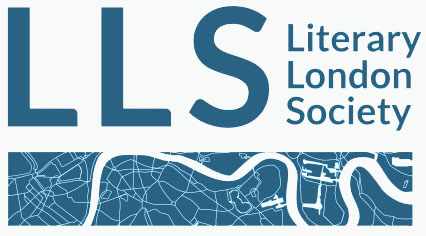Andy Croft
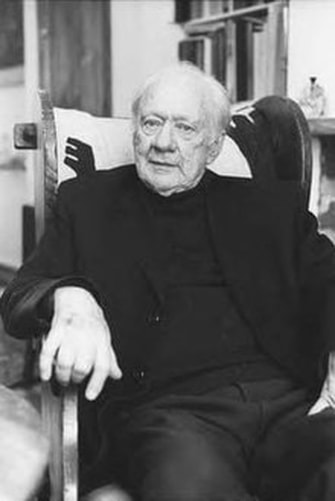
A revised version of this article appears in the book London Fictions, edited by Andrew Whitehead and Jerry White – and published by Five Leaves. You can order it direct from the publishers here.
They started off from the Fields, some 400 strong, on the five-mile march, with 150 C.S.U. strikers falling in behind. Two lads had borrowed a wooden leg from an old-age pensioner who’d been a stevedore, and had dressed it up on a black stocking provided by the fat girl who worked in a near newsagent’s shop. This black leg they then hung from an improvised gallows, an angle of wood with the notice Blacklegs Beware; and now they carried it at the head of the procession amid repeated bursts of laughter… The march went on, with slogans and songs, from Burdett Road to Commercial Road, picking up more groups on the way. A grey-headed but stalwart docker, striding in an open blue shirt, with his coat over his arm, struck up a song by William Morris:
What is this, the sound and rumour? What is this that all men hear?
Like the wind in hollow valleys when the storm is drawing near,
Like the rolling on of oceans in the eventide of fear?
’Tis the people marching on…A swing of purpose seemed to move along the line of marchers like a gold ripple of wind over a field of ripe wheat. We march towards our England in a world delivered over to the enemy of man. Now England is ours, and every note of the song, every tramp of the march is the certain pledge of the day when the people are undisputed masters of their earth… Men of Poplar, men of Shadwell, men of Wapping, men of Stepney, coming with banners and placards. Together in war, Together in Peace. Our Fight is Justice. The lines extended. The great wind of the song rose higher.
Hark, the rolling of the thunder.
Lo, the sun, and lo, thereunder
Riseth wrath and hope, and wonder,
And the host comes marching on.There were a thousand and a half men by the end, and some three thousand waiting in the Park to swell the cheer, the unending song. As the marchers came up the shady green path, a voice cried, “Are we solid?” and the thousands answered in a single shout, “Yes!”
As this passage suggests, Rising Tide is in many ways a classic example of Cold War Communist fiction. As the grammar shifts from the third to the first person, and from the past tense to the present, the crowd of striking London dockers swells on the page, via the heavily staged quotations from Morris and Shelley, to become The People. This is perhaps the kind of rhetorical gesture we expect to find in a Socialist Realist novel – too much socialism and not enough realism.
But there is rather more to Rising Tide than this – as there was, in fact, to most attempts in the 1940s and 1950s to Anglicise the claims of Socialist Realism. These dockers may be marching towards the Future, but they are also taking possession of the real East End, as the narrative follows the precise route of their march from Canning Town to Bethnal Green. And for all the Priestley-like sentimentality of these jolly cockneys, this scene takes place in the middle of one of the most violent and ideologically-charged industrial disputes of the Cold War.
Jack Lindsay was born in 1900 in Melbourne, Australia. His father was the distinguished artist Norman Lindsay, whose paintings scandalised wowserish Australia; the 1993 comedy Mermaids, starring Sam Neill, Hugh Grant, Tara Fitzgerald and Elle Macpherson, is a portrait of the Lindsays’ bohemian ménage in the Blue Mountains. After reading Classics at the University of Queensland, Lindsay moved to Sydney, and then in 1926 to London, where he established the Fanfrolico Press and the London Aphrodite in order to popularise his father’s radical ideas about art and poetry. When the press closed in 1930 Lindsay was unable to afford the passage home. Instead he retreated to the West Country, writing and publishing poetry, fiction, biography, philosophy, translations and children’s stories. He never returned to Australia.
During the Second World War, Lindsay served in the British Army in the Royal Signal Corps, before being transferred to the Ministry of Information to work as a script writer for the Army Bureau of Current Affairs. After the war, Lindsay and his second wife, the Unity Theatre actress Ann Davies, moved to Kent, and then in 1951 to Castle Hedingham in Essex. By the time he came to write Rising Tide, Lindsay had already published more than eighty books, best-known for his historical fiction, notably the ‘Prelude to Christianity’ trilogy, Rome for Sale (1934), Caesar is Dead (1934) and Last Days with Cleopatra (1935), and a trilogy of novels about the English radical tradition – 1649 (1938), Lost Birthright (1939) and Men of ’48 (1948).
Lindsay joined the Communist Party in 1941, after several years of fellow-travelling. By the early 1950s, he was a senior figure in the party’s cultural life, a crucial link with mainstream literary London (he was on the committee of the Stockholm World Authors Peace Appeal and of London PEN). Lindsay was a long-standing and loyal member of the party’s National Cultural Committee. He attended the 1948 World Congress of Intellectuals for Peace in Wroclaw, the 1949 Paris Peace Congress and the 1949 Pushkin celebrations in the Soviet Union. He visited Czechoslovakia in 1950, Poland in 1951, Romania in 1952 and 1953, and in 1954 he attended the Second Soviet Writers’ Congress in Moscow. He reviewed regularly for the Daily Worker and was responsible for the publication in English of several writers from the ‘People’s Democracies’. A hostile review in the TLS of Lindsay’s Byzantium into Europe (1952) concluded by calling for a purge of Communist Party members from British universities.
At the same time, Lindsay was also close to communist writers like Edgell Rickword, Randall Swingler and the young Edward Thompson, whose developing ideas about culture, national tradition and democracy represented a kind of ‘Cultural Opposition’ inside the party. He was on the board of Fore Publications, whose ill-fated ‘Key Poets’ series was denounced in the Daily Worker in 1950. He was also one of the founding editors of the literary magazine Arena, publishing European writers like Pasternak, Camus, Eluard, Tzara and Cassou in the face of severe Zhdanovite disapproval from the party headquarters on King Street.
Lindsay had already written three novels set in war-time Britain – We Shall Return (1942), Beyond Terror (1943), Hello Stranger (1945) – and three novels set in post-war Britain – Time to Live (1946), The Subtle Knot (1947) and Betrayed Spring (1953). Rising Tide was written as a kind of sequel to Betrayed Spring, the second of the ‘British Way’ series in which Lindsay tried to address ‘the experiences of our people in the post-war years, combining the close study of individuals with a clear historical structure… to come close to the lives, defeats and aspirations of the people who had gone through the anti-fascist war and were now being subjected to the pressures of the Cold War.’
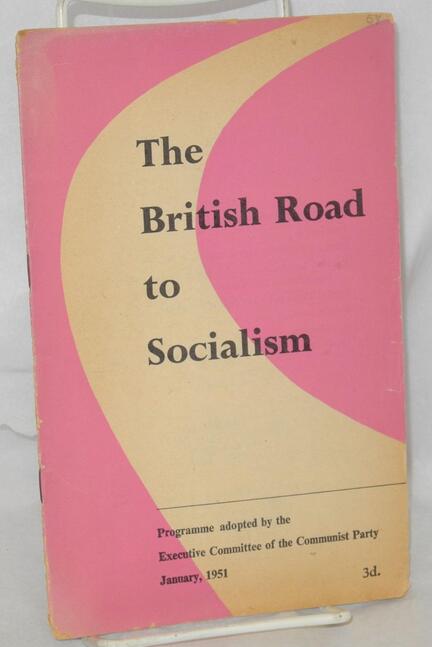 The title of the series clearly owed something to the Communist Party’s post-war programme, The British Road to Socialism, adopted after much discussion in 1951. The party now envisaged the struggle for socialism as a long and strategic war of position rather than a Bolshevik uprising (several of the chapters in Rising Tide have Gramscian titles like ‘First Skirmish’, ‘Manoeuvres for Position’ and ‘The Struggle Goes On’). But although there are overlapping narrative threads in the first three novels – the main characters of Rising Tide appear briefly in Betrayed Spring as well as in the next novel in the series, Moment of Choice (1955) – the series is not, strictly speaking, a roman fleuve. Each is a study of a specific ‘ripe’ historical moment – Betrayed Spring was about the 1946 squatters’ movement, Moment of Choice about opposition to the war in Korea, while Rising Tide is set against the events of the 1949 dock strike.
The title of the series clearly owed something to the Communist Party’s post-war programme, The British Road to Socialism, adopted after much discussion in 1951. The party now envisaged the struggle for socialism as a long and strategic war of position rather than a Bolshevik uprising (several of the chapters in Rising Tide have Gramscian titles like ‘First Skirmish’, ‘Manoeuvres for Position’ and ‘The Struggle Goes On’). But although there are overlapping narrative threads in the first three novels – the main characters of Rising Tide appear briefly in Betrayed Spring as well as in the next novel in the series, Moment of Choice (1955) – the series is not, strictly speaking, a roman fleuve. Each is a study of a specific ‘ripe’ historical moment – Betrayed Spring was about the 1946 squatters’ movement, Moment of Choice about opposition to the war in Korea, while Rising Tide is set against the events of the 1949 dock strike.
In the immediate post-war years the London docks were affected by a number of serious stoppages – in 1945, 1946, 1947, 1949 and 1951. At the start of the novel the dockers are on strike again, this time over the dismissal of ‘ineffectives’ (men over sixty-five). Before this dispute is properly settled, the London dockers find themselves involved in a strike by the Canadian Seaman’s Union. In an attempt to break the communist-led CSU, the Canadian shipowners employed a US-based company union, the Seafarer’s Union International, to attack CSU picket-lines with sawn-off shotguns, axe handles and bicycle chains. Seven strikers were shot in Halifax; two were found floating in Vancouver harbour. Within a few weeks three- hundred CSU members were in prison.
The dispute quickly became internationalised, with dockers in twenty-seven ports around the world refusing to unload Canadian ships. In London the Dock Board refused to employ men on other ships unless they crossed the Canadian picket lines. Fifteen-thousand dockers found themselves locked-out. The Labour government, the Labour Party and the leadership of the TGW and the NASD unions appealed to the dockers to cross the CSU picket-lines. Smithfield market workers came out in sympathy. In early July the government declared a state of emergency. Six-thousand troops were deployed in the port of London to unload the ships.
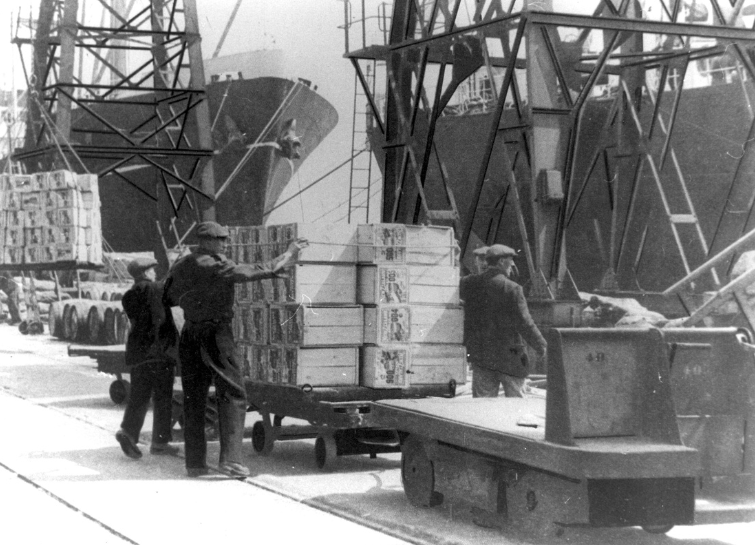
Rising Tide records in detail the progress of the dispute and the rising tide of trade union militancy which it released, in what might be described as a kind of experiment in documentary realism. The action takes place during just sixteen weeks, between 19th March and 23rd July 1949. Several real historical figures appear in the novel, including the London dockers’ leaders Ted Dickens and Albert Timothy and the Canadian Seaman’s Union leader Harry Davis. We hear of speeches made in the House of Commons by the Communist MPs Willie Gallacher and Phil Piratin; the left-wing MP John Platts-Mills (expelled from the Labour Party the previous year) speaks in the novel at a mass meeting in Trafalgar Square. The novel includes fifteen telegrams sent by the Canadian Seaman’s Union during the dispute which had not previously been published. These telegrams help to frame the story of the strike, locating the events in the red-baiting context of the Cold War and reminding readers of the violent record of union busting in north America:
April 21. Cuban gunboat opened fire with rifles and tommy-guns on crew Canadian Victor… April 29. Montreal. Hundreds of mounted police last night ambushed C.S.U. men outside St. John… May 1. Crew of scabs being flown over to England… May 23. David Joyce of S.I.U. arrested Montreal for carrying loaded firearms… June 8. Montreal. Third member of our Union found dead floating in bay of Los Angeles California stop..’
For all this, Rising Tide is primarily a love story, following the fortunes of a young docker and his wife as they struggle to make ends meet. At the beginning of the novel Jeff and Phyl are impatient to be married, but are frustrated by being unable to find anywhere to live. Eventually they find a squat in wooden hut on ‘the dump’ near Albert Dock:
They went down a side-street by the Seamen’s Hospital, through the thin March sunlight. Children in the roadway were kicking an india rubber ball with a hole in it, while a dog barked jealously behind a gate… They turned into Customs House Fields, which stood deserted this afternoon; then they skirted the Connaught Approach of the Albert Dock, and moved on into the open fields… the wider space of straggling grass and bush, with three hobbled horses on the left and as clump of shacks on a slightly raised level well ahead… They turned and stood scanning the giant cranes that loomed over the hidden dockland, clearly limned against the faintly luminous sky… The path became narrow and she let him lead the way between the patches of tall grass and the scratchy bushes, the heaps of coiled rusting wire and the treacherous channels. Then in a few moments they climbed up on to the raised part and she saw the gunpits plainly… Fancy living in such a dump.
Rising Tide is above all a book about London, specifically the docklands. The Bodley Head described the novel on the dust-jacket (designed by the communist artist James Boswell) as:
a novel of London’s river, of its ships and commerce, but above all of the people of dockland, the young and the old, the dockers and their families, the men and women of strength and spirit who in the past have suffered and today are perhaps more misunderstood and blamed than any other group in the nation.
Much of the novel takes place on ‘the Stones’, on the Custom House Fields, and in the pubs and cafes of Canning Town. Jeff drinks with some Canadian seamen in a pub off Cyprus Place. The unofficial Lockout committee holds its meetings in the White Hart in Stepney. Jeff addresses an AEU meeting in rooms near London Bridge. When he is arrested during the Lockout he spends ten days in Pentonville prison. Hackney Trades Council, Stepney Trades Council and the London Trades Council pledge their support for the dockers.
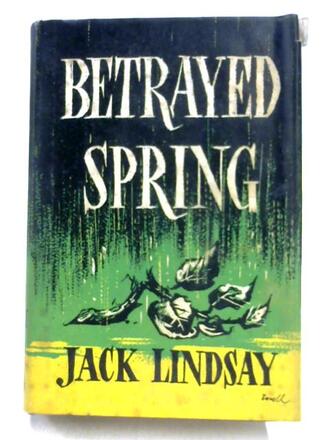
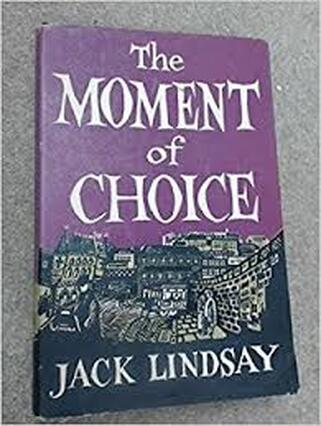 The TLS devoted a leading article to sneering at Rising Tide and the other two novels in the trilogy, disingenuously quoting Keats against Lindsay (‘We hate poetry that has a palpable design upon us…’). But Rising Tide is not quite the programmatic novel that readers today might expect. Jeff doesn’t join the Communist Party at the end of the novel (although one of his mates does). The CP characters have a habit of talking over the heads of their listeners, who are often left with a feeling of ‘being strangers, humdrum nonentities quite outside the stirring world of great persona and great events’. The climax of the novel may be a set-piece mass demonstration in Trafalgar Square, but the scene concludes, not with a street fight against mounted police, but with a successful whip-round for the Canadian seamen.
The TLS devoted a leading article to sneering at Rising Tide and the other two novels in the trilogy, disingenuously quoting Keats against Lindsay (‘We hate poetry that has a palpable design upon us…’). But Rising Tide is not quite the programmatic novel that readers today might expect. Jeff doesn’t join the Communist Party at the end of the novel (although one of his mates does). The CP characters have a habit of talking over the heads of their listeners, who are often left with a feeling of ‘being strangers, humdrum nonentities quite outside the stirring world of great persona and great events’. The climax of the novel may be a set-piece mass demonstration in Trafalgar Square, but the scene concludes, not with a street fight against mounted police, but with a successful whip-round for the Canadian seamen.
Speaking at a 1953 CP conference on ‘Socialist Realism and the British Cultural Tradition’, Lindsay explicitly argued that Socialist Realism did not mean simply tendentious or partisan literature. ‘Socialist Realism means more than just thinking of the workers as audience. It means the attempt to find an active contact with this audience in new ways, for help and for criticism… To get this give-and-take the writer must go out to the workers in new and considered ways.’ In order to write Rising Tide, Lindsay had spent a good deal of time talking to some of the key participants in the dispute, including Ted Dickens and Albert Timothy. When the book was published in December 1953, Lindsay spoke at a public meeting at the Marx Memorial Library about the process of writing it. The importance of the novel to the Communist Party is suggested by the fact that it was reviewed twice in the Daily Worker, first by Patrick Goldring (‘a vivid account of the dockers’ struggle… a penetrating and warmly human novel of enduring value… marks the beginning of a great advance in British progressive writing’) and then the following week by Reg Spalding, one of the dockers who had helped Lindsay write it (‘a warm and human book… a great attempt at a real working-class novel, and it is a very enjoyable book. My wife enjoyed every word.’) The Marxist critic Alick West considered the trilogy Lindsay’s best work. Rising Tide was published in translation in Poland in 1955 and in Romania in 1960.
Lindsay was always too interested in the contradictions between and within individuals to idealise working-class life. Jeff goes on a drinking spree although he and Phyl are desperately short of money. Later he loses the last of their money at cards. When some travelling families arrive on the dump, some of the squatting families are welcoming, but others hostile. Jeff’s father is an argumentative Unitarian, Phyl’s father is an anti-communist Daily Herald reader; her brother is in borstal, and her sister is a long-suffering (and loudly complaining) martyr to her hopeless husband. Beyond their immediate families there are the gamblers, the drinkers and the good-time girls of dockland, the easily-led and the lazy, the feckless, the reckless, the overworked and the unemployed. And further still lie London, the Thames and the wide world of work and struggle:
Above the dismantled hut next door the sky showed a dim radiant mauve. The colour-effect was startling in its subtle simplicity, with the broken hut providing a start strong pattern of dark ruin on the soft flowing warmth of light. It’s coming, he thought, it’s coming. And he suddenly felt the situation unutterably strange – the lovely broken scene outside, the fragile and lovely sweetness of Phyl in the small room with him, the struggle coming tomorrow or the day after with its complex interlocking of small and large forces, the impassive and ruthless mechanisms that would seek to flatten out the resistances of the portworkers, and the unconquerable spirit of brotherhood that rose up afresh out of every defeat. We’re ready, he thought, and turned to take Phyl in his arms.
At the beginning of the novel neither Jeff or Phyl are very interested in ‘politics’. Their lives seem to be determined by historical forces beyond either their understanding or their control. When Jeff is locked-out he feels that she does not support him. When he comes home late from a union meeting, she accuses him of being more interested in the union than he is in her. Jeff’s loyalties are divided between Phyl and the union, between his union and the government, and between the unofficial dockers’ leaders and Transport House. For their communist friends, the lessons of the dispute are clear:
“The bosses and the Labour right wing that are the bosses’ last hope,” said Hugh,
“will always go on using every element of division that class-society has created among the workers – craft-divisions, petty little variations of status and privilege, wage variations, men against women, women against men, unskilled against skilled, blackcoat against manual worker, regional and sectional jealousies or cleavages, even T.U rivalries… Anything to keep the workers from realising their united strength. And we’ve got to be on our tiptoes against these efforts. Every big struggle breaks some of ‘em down.”
But for Jeff and Phyl, the events have taught them something important about living together. Jeff is amazed to find that while he was in prison she has been working for the Lockout committee (‘My Phyl that wouldn’t say boo to a goose’). The first night together after his release, they realise that the ‘crystalline balance’ of their relationship has changed. ‘The simple adventure into one another’s privacies, physical and spiritual – a discovery and a union – had given way to something more complicated. They were now more aware of one other as individuals… One had to keep making demands on the other, or growth and full intimacy were impossible.’ The novel ends with a good rhetorical flourish, connecting the personal and the political elements of the story:
They had a feeling that they’d got to bedrock, at least they’d seen as far into things as they were likely to see for the present… He held out his hand and she took it… “Nothing’s ever going to come between us,” he said. And he felt his words as both a pledge of the deepened union between them and a warning to all the forces in the world that sought to divide and fetter the lives of men and women.
But there is an unavoidable hollowness to this passage that cannot have escaped the attention of contemporary readers. The dispute is won, but it is a small victory in a much larger historical defeat. The springtime of 1945 was betrayed by ‘the failure of the Labour government to meet the challenges of vested interests and to build the new sort of society that would have expressed the emotions of the people who had voted for it in 1945… a democracy developed out of the elements of genuine anti-fascist unity built up in the war years.’ By the early 1950s, the Cold War divisions about which the novel warns were still widening. Gallacher, Piratin and Platts-Mills all lost their seats in the 1950 general election. A few weeks after the end of the dispute, the Transport and General Workers Union voted to ban communists from holding office. Three of the leaders of the dispute – including Ted Dickens – were expelled from the union. In 1951 Dickens and Timothy were among seven dockers’ leaders charged with ‘conspiracy’ following an unofficial strike in the ports of Liverpool and London. In 1956, Khrushchev revealed the extent of Stalin’s crimes at the 20th Congress of the CPSU; a few months later Soviet tanks were in Budapest. A third of the membership of the British Communist Party resigned, including most of the ‘cultural opposition’.
Jack Lindsay remained in the party until his death in 1990. He wrote seven more novels in the ‘British Way’ series – Moment of Choice (1955), A Local Habitation (1957), Revolt of the Sons (1960), All on the Never-never (1961, filmed in 1962 as Live Now, Pay Later), The Way the Ball Bounces (1962), Masks and Faces (1963) and Choice of Times (1964) – slowly detailing the long arc of defeat of progressive ideas in post-War Britain. He also returned several times to London as a subject with biographical and critical studies of Blake, Dickens, Meredith, Morris, Defoe, Turner and Hogarth. When Lindsay died, he had written, translated and edited over one-hundred-and-seventy books.
Rising Tide may be as forgotten today as the events which it describes, but the novel remains a unique literary record of the years between the end of the Second World War and the beginnings of the Cold War, a fictional portrait of East End working-class life that successfully negotiated both the heroic and anti-heroic, and a compelling account of a neglected chapter in the history of London radicalism.
Andy Croft is a writer and poet who lives in North Yorkshire: http://andy-croft.co.uk/ He runs Smokestack Books which publishes radically good poetry.
The Changing Tides in Docklands
Few parts of London can have changed so much in the last half-century as the dockland communities described in Rising Tide of Canning Town, Custom House and Beckton. In 1949 the Victoria and Albert docks wholly dominated this part of the East End, its economy and sociology, its landscape and politics.
With the expansion of the Essex container ports of Thurrock, Tilbury and Canvey Island, both the Albert Dock and the Victoria Dock closed to commercial traffic in the 1980s. Albert Dock is now the home of the London Regatta Centre. These days Victoria Dock hosts the annual London Boat Show.
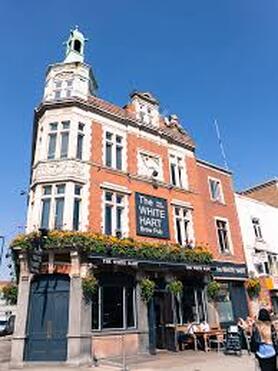
The Custom House Fields and the wasteland where Phyl and Jeff squat in Rising Tide were built on long ago. The Seamen’s Hospital was demolished in 1993.
You can still buy a drink in The White Hart in Stepney, where the unofficial Lockout committee meet in the novel, but The Ferndale on Cyprus Place where Jeff drinks with the Canadian seamen is now boarded-up. HMP Pentonville still exists; notable recent prisoners there have included Pete Doherty, Boy George and George Michael.
London City Airport is located at Albert Dock, as is the Docklands Campus of the University of East London. The ExCel Exhibition Centre is on the northern side of the Victoria Dock. Owned by the Abu Dhabi National Exhibition Company, in recent years the Centre has hosted the Motor Show, the 2009 G20 Summit, the UK arms fair as well as auditions for Britain’s Got Talent and The X Factor. In 2012 it was one of the venues for the London Olympics.
References and Further Reading
Andy Croft (ed), A Weapon in the Struggle: the Cultural History of the Communist Party in Britain, Pluto Press, 1998
Jack Dash, Good Morning Brothers, Lawrence and Wishart, 1969
Colin J Davis, Waterfront Revolts: New York and London Dockworkers, 1946-61, University of Illinois Press, 2003
Essays on Socialist Realism and the British Cultural Tradition, Arena Publications, 1953
Jim Fyrth (ed), Labour’s Promised Land? Culture and Society in Labour Britain 1945-51, Lawrence and Wishart, 1995
A site devoted to Jack Lindsay: https://jacklindsayproject.com/biography/
